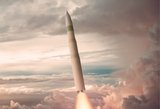Dassault's death spurs speculation over fate of French empire
Speculation was swirling on 29 May over the future of the French aeronautics and defence empire built by Serge Dassault, the industrialist-turned-politician who died aged 93 after heart failure at his Paris office.
With interests ranging from cutting-edge jets and industrial design software to wine and an auction house, Dassault's family company holds outsize influence, not least given its key role as a pillar of France's defence strategy.
Yet although he took the reins from his father, Dassault pointedly did not designate a family heir among his own four children, who all sit on the holding company's board.
Olivier Dassault, a lawmaker for the Oise region near Paris, told Europe 1 radio on 29 May following his father's death on 28 May: ‘There won't be any arguments among his inheritors. In any case that is the promise I can make today before you, my brothers and sisters, and all French citizens.’
Olivier Dassault's brother Laurent oversees the family holding company's investments, while another brother, Thierry, has specialised in economic intelligence, the rightwing Figaro newspaper – also a family holding – wrote in a homage to Dassault on 29 May.
Their sister Marie-Helene, who focuses on philanthropy, was named head of the holding company's board in 2018.
The four siblings have equal stakes in the holding company, but that has not avoided frictions – Olivier once declared himself ‘the most qualified’ to take his father's place, earning a stern public rebuke from his father.
Officially Serge Dassault will be succeeded by his right-hand man Charles Edelstenne, 80 years old and a former head of Dassault Aviation, the family's crown jewel.
Claude Carlier, a historian who has written extensively on Serge and his father Marcel, said: ‘Unlike his own father, he prepared for this.’
And Edelstenne hand-picked Eric Trappier as his successor at the plane maker in 2013, though analysts expect that like Dassault, Edelstenne is unlikely to be a passive observer at any of the family's companies.
Olivier Dassault said of Edelstenne: ‘Today we have a president of our group who was designated well before my father's death, whom we voted for unanimously.’
But French media reports have often alluded to tensions within the family, notably the father's supposed disappointment that none of his children obtained an engineering degree as he did – at France's elite Polytechnique school.
According to French magazine Challenges, a succession plan laid out in 2009 stipulates that no shares in the holding company can be sold to anyone other than direct Dassault descendants for the ten years following the deaths of Serge and his wife Nicole, who is four years his junior.
Yet it is unclear if their children will share their father's passions for planes, new technologies, the press and the Chateau Dassault vineyard in Bordeaux.
In any case, they will be closely watched by the French government since Dassault planes are core to the country's nuclear dissuasion policy as well as its overall military independence.
In 2014 it signed an accord with the holding company making the state ‘the guardian of the temple’, effectively giving it a say on any shareholder shake-ups.
Olivier Zajec, a defence specialist at Lyon III University in southeast France, said: ‘Dassault Aviation is an integral part of France's pursuit of strategic autonomy.’
‘It's also a question of the future of air power,' Zajec said, in particular Dassault's role in developing a French-British combat drone for 2030, and a French-German combat jet set to enter service by 2040.
Dassault Aviation is also the main shareholder in French defence and arms group Thales, holding 25% alongside the state's 26%.
Olivier Dassault said: ‘It's not a matter of who will be number one, number two or number three. It's a matter of pursuing my grandfather's work, my father's work.’
More from Defence Notes
-
![US Air Force pushes Sentinel’s initial capability to early 2030s despite China’s nuclear progress]()
US Air Force pushes Sentinel’s initial capability to early 2030s despite China’s nuclear progress
While the US struggles to modernise the 50-year-old land leg of its nuclear triad, China has been rapidly developing and fielding new nuclear capabilities.
-
![New opportunities for defence firms as EU steps up support for Ukraine]()
New opportunities for defence firms as EU steps up support for Ukraine
The European Commission is looking for startups and other innovators to address challenges across the land, air and sea domains.
-
![Why small guns have been critical to layered CUAS architectures]()
Why small guns have been critical to layered CUAS architectures
Multiple countries have been deploying small arms as the last line of drone defence due to their multiple operational and tactical advantages.
-
![Singapore Airshow 2026: ST Engineering hints at export success for AME assault rifle family]()
Singapore Airshow 2026: ST Engineering hints at export success for AME assault rifle family
The Singapore-based technology company unveiled its new rifle family at this week’s airshow. Chen Chuanren spoke with the ST Engineering’s head of small arms to find out more about how the weapons have been refined.
-
![High tension in the High North – a wake-up call for NATO’s future Arctic defence efforts?]()
High tension in the High North – a wake-up call for NATO’s future Arctic defence efforts?
Any potential ‘Arctic Sentry’ mission would be months in the planning, but with tensions high in the region given the US’s push for Greenland, NATO countries will need to continue to emphasise their commitment to the region, analysts have said.























